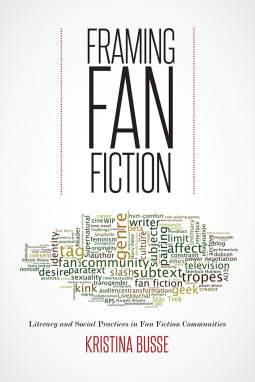
Framing Fan Fiction
Literary and Social Practices in Fan Fiction Communities
by Kristina Busse
This title was previously available on NetGalley and is now archived.
Send NetGalley books directly to your Kindle or Kindle app
1
To read on a Kindle or Kindle app, please add kindle@netgalley.com as an approved email address to receive files in your Amazon account. Click here for step-by-step instructions.
2
Also find your Kindle email address within your Amazon account, and enter it here.
Pub Date Oct 01 2017 | Archive Date Sep 30 2017
University of Iowa Press | University Of Iowa Press
Description
Framing Fan Fiction deploys personal history and the interpretations of specific stories to contextualize fan fiction culture and its particular forms of intertextuality and performativity. In doing so, it highlights the way fans use fan fiction’s reimagining of the source material to explore issues of identities and peformativities, gender and sexualities, within a community of like-minded people. In contrast to the celebration of originality in many other areas of artistic endeavor, fan fiction celebrates repetition, especially the collective creation and circulation of tropes.
An essential resource for scholars, Framing Fan Fiction is also an ideal starting point for those new to the study of fan fiction and its communities of writers.
Available Editions
| EDITION | Other Format |
| ISBN | 9781609385149 |
| PRICE | $45.00 (USD) |
| PAGES | 258 |
Average rating from 10 members
Featured Reviews
 Kimberly O, Educator
Kimberly O, Educator
Kristina Busse has written a thoughtful and thought provoking book that takes fans and fan fiction seriously. While she concentrates on elements of sex, particularly slash fiction, the underlying ideas seemed true for all of fan fiction. I particularly appreciated her focus on community within fandoms. Her focus on gender was fascinating and gave me a lot to think about.
I enjoyed stretching my academic reading muscles with this book. It is a worthwhile read for people who are fans or interested in fandom and fan fiction.
 Lauren B, Reviewer
Lauren B, Reviewer
Fascinating Collection of Papers
As a fan involved in fandom and with many online friends who do the same, I found this collection of papers absolutely fascinating. I enjoyed the melding of academic literature and exemplary fanfic from a wide variety of styles and fandoms. Of course, some chapters appealed to me more than others – the middle section on Canon in particular, as well as chapter 9 on the Geek Hierarchy.
Given the ever-changing nature of fandom, it is unsurprising that some of the content feels a little dated, but the conclusions are still robust and applicable to modern times. The academic style of these papers did make them quite heavy reading, but no more so than any other academic paper. I would recommend these to anyone with more than a passing interest in fanfic, literature, media studies, or any combination or derivative of the above. Fanfic as a field is varied and interesting, and as diverse as this collection is, it makes clear there is still so much more to study.
Fanfiction is very frequently overlooked by "serious readers" and academic studies on it are scarce. This book comes to fill this gap in research, providing a very informative and detailed account of the community surrounding fanfiction and very aptly connecting it to literary theories, thus proving that the well-written pieces of fanfiction not only exist but can be academically studied as well. All in all, I believe this book is very important since it not only researches a topic which has been marginalised by most but also proves that academia doesn't have to be about boring and dry subjects that everyone is researching.












